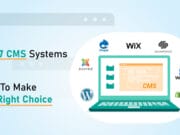Running your own website has never been easier thanks to some of the fantastic CMS (Content Management Systems) out there such as WordPress, Joomla, and Drupal. Each of these is very popular all around the world, though it’s WordPress that leads the way.
Over 30% of all the websites on the internet are built and managed with the WordPress platform. That is a huge number of websites! From its humble days as being a simple blogging tool, WordPress has literally taken over the world in terms of web development and is a platform that continues to evolve and grow on a regular basis.
Benefits of WordPress

One of the great things about WordPress is its versatility. It is something that you can use to create all types of websites, from simple blogs to full-blown E-Commerce stores, membership sites, and learning centers. There is really no limit as to what type of website you can develop with the WordPress platform.
Along with the hundreds of beautifully designed themes, you can also download and use lots of different plugins that are available for free from the repository, as well as those that have been developed by companies and individuals and which are sold online.
Recommended for you: 8 Tips to Improve Customer Service on Your WordPress Website.
Life in the Post Covid-19 world

The past 8 months or so have been unlike anything we’ve ever experienced before in our lifetimes. The pandemic that has hit is one that has changed many things in our lives, and things that we once took for granted are now things that we can only do with strict limitations put upon them.
Carrying on with our everyday lives has meant that we’ve had to adapt, and one of the things that have really taken off during that time has been how we are using the internet.
Many people all around the world have been working remotely from home, rather than commuting to their offices each day. Meetings have taken place through online conferencing software such as Skype or Zoom. Even schools have started carrying out lessons for students online. In fact, learning online is something that has really taken off over the past 6 months. There are lots of websites where you can read about the different systems being used for online courses.
Learning Online

For many years now, there have been lots of websites that offer training and education online. You can find a huge selection of online courses from various vendors on the internet teaching everything from app development and web design through to learning other languages or various arts and crafts.
With the pandemic that struck in 2020, there was a huge uptake in online learning and education, and more and more people decided to start offering their own courses online, rather than in schools or educational centers. With the effects of Covid-19 still causing major disruptions to our everyday life such as the need for social distancing, it simply makes more sense to offer educational courses online.
Using WordPress as an LMS (Learning Management System)

As mentioned at the start of this article, WordPress is an extremely powerful and flexible content management system and is used for all types of websites.
One thing that it can also be used for is to run an LMS, which can allow an individual the ability to create and run an online course through a WordPress website. Students can sign up for your course, and then go through the various lessons at their own pace. Many courses are video-based, though there is also a number that is more text-oriented. It all depends on what the course is actually about.
WordPress is a very easy platform to use, and once you’ve got to grips with the basic elements such as creating a new page or post, then everything else is very easy to do. Images can be uploaded quickly and easily via the media section of the admin panel and applied to any page you want.
If your online courses are going to use a lot of visuals, and you will be uploading a lot of images, then it is a good idea to download and install a plugin such as Smush, which is an image optimizer, which will reduce the file size of your images, making your web pages quicker to load.
There are lots of different systems that offer the ability to run an online learning course, with some of the most popular including Adobe Captivate, Docebo, LearnUpon, and Mindflash. These are all cloud-based LMS and have a lot of great features.
You may like: 3 Different Ways to Add Custom Fonts to Your WordPress Site Theme.
Which LMS to use with WordPress?

However, there are also a number of WordPress plugins that you can purchase or systems to subscribe to, which will allow you much of the same features and functionality at a much lower cost. This makes them perfect for individuals who are highly experienced in a certain market or niche, and who want to share their knowledge with others as well as make some additional income.
Most of these will have a yearly license for single or multiple websites, so if you are planning on creating a number of different courses, then you’ll want to do a little research first to determine which one will be best for you.
Below we will take a brief look at some of the most popular options for creating your own LMS using the WordPress platform.
LearnDash
 LearnDash is easily the most popular plugin for developing a WordPress based LMS. The plugin is available for a single site and comes with 12 months of support and updates. It is a very powerful plugin that is packed with features. It’s easy to use and the drop and drag builder makes it a breeze to create the modules for your course. There are also lots of features that you can use to monetize your course. You can read the Collectiveray review of Learndash to find out it’s all pros and cons.
LearnDash is easily the most popular plugin for developing a WordPress based LMS. The plugin is available for a single site and comes with 12 months of support and updates. It is a very powerful plugin that is packed with features. It’s easy to use and the drop and drag builder makes it a breeze to create the modules for your course. There are also lots of features that you can use to monetize your course. You can read the Collectiveray review of Learndash to find out it’s all pros and cons.
Teachable
 This is not a plugin that you can install on your own site, but rather a course builder that runs on WordPress, for which you can create your own subdomain, or set up a custom domain for it. It’s essentially a solution that is hosted for you. There are lots of great features with Teachable, and it should be more than suitable for most users. One of the big advantages is that you don’t have to worry about any of the technical sides of things such as hosting, updates, etc. It’s all taken care of for you.
This is not a plugin that you can install on your own site, but rather a course builder that runs on WordPress, for which you can create your own subdomain, or set up a custom domain for it. It’s essentially a solution that is hosted for you. There are lots of great features with Teachable, and it should be more than suitable for most users. One of the big advantages is that you don’t have to worry about any of the technical sides of things such as hosting, updates, etc. It’s all taken care of for you.
Sensei
 This solution is a plugin-based one, so you’ll be installing it onto your own site. It’s fairly easy to use the system but lacks some of the more advanced features of other LMS’s you can use. Sensei works with WooCommerce, which you’ll need to use for payments or to sell your course. If you already have a WordPress website that uses WooCommerce, then this is a great one to use. But if not, you might want to use an alternative such as Learndash.
This solution is a plugin-based one, so you’ll be installing it onto your own site. It’s fairly easy to use the system but lacks some of the more advanced features of other LMS’s you can use. Sensei works with WooCommerce, which you’ll need to use for payments or to sell your course. If you already have a WordPress website that uses WooCommerce, then this is a great one to use. But if not, you might want to use an alternative such as Learndash.
LifterLMS
 Another very flexible option is LifterLMS, which is a very powerful plugin that can be used to create all kinds of online courses. It can easily be added to an already existing WordPress site, which is great if you are already using that platform for your web presence. You can set up courses that are multi-tiered, allowing you the ability to create different types of courses, from simple starter courses through to full-blown educational programs.
Another very flexible option is LifterLMS, which is a very powerful plugin that can be used to create all kinds of online courses. It can easily be added to an already existing WordPress site, which is great if you are already using that platform for your web presence. You can set up courses that are multi-tiered, allowing you the ability to create different types of courses, from simple starter courses through to full-blown educational programs.
You’ll be able to use a number of their fantastic add-ons which include an affiliates plugin, meaning that you can have other people promoting your course, and earning a small commission for each signup that they bring to you. LifterLMS is a great option for your courses and one that you should seriously consider using.
You may also like: How to Create an Online Electronics Store Using WordPress?
A few final thoughts

There are lots of other plugins and platforms that you can use to create and operate your online courses. Each has its own pros and cons, so it’s important that you spend a little time researching all of the available options and picking the one that you believe best fits with your needs.
If you are comfortable with running your own website, then going for the plugin option is probably your best bet, but if you are new to web development then you should probably consider a hosted solution. The only problem with a hosted solution is that you are never truly in control of everything, and are always relying on a third party. If they suddenly decide to change their prices for example, then you are simply going to have to pay an increase they are asking for.
The great thing about WordPress is that there are tons of great themes and plugins that you can use for your websites. You could even create a couple of landing pages for your course using the platform if you want to run ads, such as Facebook ads, which can be very powerful when you target the right audience. Many websites already use the WordPress platform, so running your own online courses via your own website is a no brainer.





